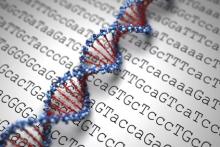A novel genomewide association study has revealed new biologic insights from 108 schizophrenia-associated genetic loci.
"As recently as 5 years ago, we still lacked proof that mental disorders had a genetic basis," one of the researchers, Dr. Nelson B. Freimer, a University of California, Los Angeles, professor of psychiatry and director of the UCLA Center for Neurobehavioral Genetics, said in a press release. "This work now demonstrates unequivocally that at least 100 distinct genes contribute to schizophrenia. By providing the strongest evidence to date for the biological underpinnings of mental illness, this study is of historic importance."
In a study published online in Nature, researchers from the Schizophrenia Working Group of the Psychiatric Genomics Consortium reported findings from a multistage schizophrenia genomewide association study of up to 36,989 cases and 113,075 controls (Nature 2014 July 22 [doi:10.1038/nature13595]). Noting that high heritability "points to a major role for inherited genetic variants in the etiology of schizophrenia," the working group cited current estimates suggesting that one-half to one-third of the genetic risk of schizophrenia "is indexed by common alleles genotyped by current genomewide association study (GWAS) arrays. Thus, GWAS is potentially an important tool for understanding the biological underpinnings of schizophrenia."
The researchers obtained genomewide data from 36,989 cases and 113,075 controls. From this data set, they identified 128 independent associations spanning 108 conservatively defined loci that had genomewide significance. Of these 108 loci, 83 have not been previously implicated in schizophrenia and therefore harbor "potential new biological insights into disease" etiology. Molecules that are the most current, or promising, target for therapy were associated with schizophrenia, including the dopamine D2 receptor (DRD2) gene as were many genes involved in glutamatergic neurotransmission and synaptic plasticity, including GRM3, GRIN2A, SRR, and GRIA1. Associations between schizophrenia and genes that encode voltage-gated calcium channel subunits, including CACNA1C, CACNB2, and CACNA11, also were observed. The observations "extend previous findings implicating members of this family of proteins in schizophrenia and other psychiatric disorders," the investigators wrote.
The working group found associations between schizophrenia and enhancers active in the brain; they also found associations between schizophrenia and enhancers active in tissues with important immune functions, especially B-lymphocyte lineages involved in acquired immunity, such as CD19 and CD20. "Epidemiological studies have long hinted at a role for immune dysregulation in schizophrenia, [and] the present findings provide genetic support for this hypothesis," the investigators wrote.
They also found significant overlap between genes in the schizophrenia GWAS-associated intervals and those with de novo nonsynonymous mutations in schizophrenia (P=.0061) "suggesting that mechanistic studies of rare genetic variation in schizophrenia will be informative for schizophrenia more widely." They concluded by noting that the way in which variation in these genes affects function to increase risk for schizophrenia "cannot be answered by genetics, but the overlap strongly suggests that common and rare variant studies are complementary rather than antagonistic, and that mechanistic studies driven by rare genetic variation will be informative for schizophrenia."
The National Institute of Mental Health provides core funding for the Psychiatric Genomics Consortium. The study also was supported by numerous grants from governmental and charitable organizations as well as philanthropic donations. Authors of the working group declared several competing financial conflicts of interest.
On Twitter @dougbrunk


